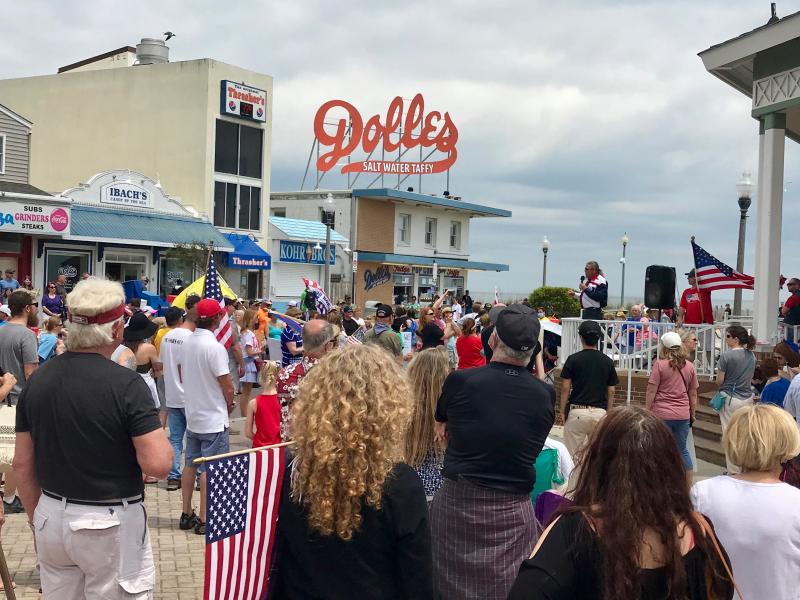Odd political moment in a beach storm that became a shower
The Storm the Beach rally organized by the Reopen Delaware organization last Saturday, May 16, ended up being more like a spring shower. A crowd of a few hundred people gathered around Rehoboth’s bandstand for the noon rally, but dwindled to several dozen by the time a small brigade marched its way over one of the dune walkways to the water in a classic American act of civil disobedience.
Rehoboth Beach police and Delaware State Police kept an eye on the peaceful proceedings but, respectfully, showed little interference.
Earlier in the week, during the hallmark uncertainty of the coronavirus, Rep. Pete Schwartzkopf said he didn’t know what to expect of the rally. At a previous Reopen Delaware event in Dover two weeks ago, a small group of men – four or five private citizens – showed up wearing dark tactical gear and carrying assault rifles. “I don’t know what they were trying to prove,” said Schwartzkopf. “Probably exercising their Second Amendment freedoms. I’ve heard some of them say on occasion that they’re not trying to intimidate anyone, but they definitely are intimidating. As far as the Rehoboth rally is concerned, I would say this is not a time to be unprepared.”
Delaware State Police clearly were not. A state police helicopter flew over the area earlier in the morning, horse-mounted patrols were deployed nearby, and tactically trained groups of five officers were placed strategically around the street ends in the vicinity of Rehoboth Avenue. Rehoboth Beach Police officers and cadets monitored beach goers and offered guidance about social distancing to people who showed up on a warm, sunny day after barricades were finally removed.
The strong police presence ultimately didn’t prove to be necessary, but there’s no question they were prepared.
And although the storm gave up much of its energy to rallying speeches, patriotic songs and prayers, that crowd waving flags, wearing red, white and blue clothing, cheering calls for freedom and carrying sloganed signs proved a beautiful sight as young and old energetically exercised their constitutional First Amendment rights guaranteeing freedom of speech and peaceful assembly.
Miscellaneous observations
• One nattily dressed man took the microphone, wearing a flag-colored shirt, packing a pistol tucked into his belt at his back, proudly flying his long, graying, neatly tied ponytail freak flag.
He spoke eloquently about freedom and responsibility, and said he wanted no part of partisanship of any stripe. I don’t remember much of what was spoken through the loudspeakers during the rally, but one simple, pointed question he asked of the attentive crowd – and its response – registered firmly in my brain’s recording device.
“How many state legislators are here today?” he asked.
Heads began turning, looking in all directions, toward the people in circles around them, toward the people gathered in the streets on either side of the rally, toward those on the sidewalks in front of ice cream, french fry, pizza and caramel corn shops.
A short moment of thick silence interrupted the spirited rally. Not a single hand went up. That struck me as odd at best, troubling at worst. Politicians, especially in an election year, rarely miss an opportunity to be present when there are large public gatherings of people.
A sign of the times, I guess, and the challenging weirdness of dealing with this alien force we know as the coronavirus.
• Earlier in the week, Delaware Public Health Director Dr. Karyl Rattay offered a sense of the seriousness of the coronavirus compared to the spread of the garden-variety influenza that has been infecting us every winter for the past several years. She said during a normal flu season running typically from December through February, Delaware will register about 11 flu-related deaths, with one of those being in a long-term care facility. The coronavirus has already killed nearly 300 people in Delaware this year with well over half of the victims being long-term care residents. “This is unlike anything we’ve ever seen before,” said Rattay.
• A month or so ago, a local funeral director told me he thinks the actual death count in Delaware from coronavirus is higher. He said he thinks the virus is claiming more older folks even though the exact symptoms may not be what we now consider typical of corona. As such, the cause of death may, in many cases, not be listed on death certificates as related to COVID-19, and consequently those cases don’t show up in state statistics.
• A.J. Schall, director of the Delaware Emergency Management Agency, said Delaware National Guard members will be used in the massive contact tracing program detailed by Gov. John Carney during last week’s press briefing. Particularly helpful, said Schall, is that 10 to 15 percent of Delaware National Guard members are bilingual. I don’t think it’s too rash of an assumption that most of that bilinguality involves English and Spanish, which will be helpful in Sussex County’s large immigrant population.
• Carney said he would like to see the contact tracing program involving about 80,000 corona tests each month for the next several months. “That means our entire population will have been tested in about a year.” He said those testing positive in the program will be advised of what they should do, including quarantining themselves for 14 days. That’s when the contact tracing begins. National Guard members and 200 temporary state employees being recruited now will contact those testing positive – mostly by telephone. What those contacts will be determining, said Carney, is which other people have been in contact with those who have tested positive. “We want to determine who has been within six feet of infected people for more than 10 minutes in the two days prior to the onset of symptoms, so they too can be contacted to take precautionary steps.”
• How about compliance with all the state directives, and enforcement? Carney said little on this, but what he did say speaks to the practical limits of what government can do. “We realize that compliance depends primarily on voluntary compliance.”
























































